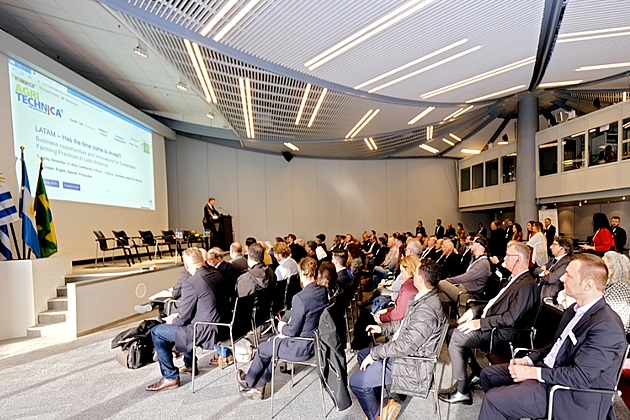768

President of DLG, Hubertus Paetow, officially opened the Agritechnica conference. As the organizer of Agritechnica, DLG (German Agricultural Society) welcomed around 1,700 international guests, including numerous delegations from outside Germany.
Role of Modern Machines
The central role of modern agricultural machinery in addressing sustainable farming challenges is reflected in this year's main theme "Green Productivity" at Agritechnica. The world's largest trade fair shows that only innovations have the potential to harmonize productivity with resource and climate protection globally.
Agriculture and the agricultural technology sector are under pressure, according to DLG President Hubertus Paetow. "For a long time, the main goal for farmers, including myself, was to provide a growing population with sufficient food. Today, markets not only impose the highest demands on quantity, price, and quality of the end product but also on the sustainability of the entire process chain. A sustainable agricultural sector must conserve natural resources, but there is no simple solution to this. Knowledge, skills, and innovation are needed to bring about change.
It has always been technical and professional progress that, alongside increasing productivity, could improve resource conservation, such as reduced soil work or digital systems for sectional area management," said the DLG president, emphasizing the importance of technical innovation in solving problems.
Global Leading Location for Innovation
Agritechnica is the world's most important innovation center for the agricultural sector. As a showcase and professional forum, the world's largest agricultural machinery trade fair provides answers to both productivity and resource conservation challenges in agriculture.
"This is where pioneers, visionaries, and experts from around the world come together to present, discover, and discuss the latest technologies, solutions, and ideas for agriculture. Agritechnica is the international driving force for sustainable, efficient, and innovative agriculture," added Paetow.
In a world where demand for food, energy, and other goods is continually increasing, the finite value and nature of natural resources must not be ignored. Therefore, it is imperative to develop intelligent global strategies and processes to reconcile increased productivity with resource and climate protection.
"Sustainable and efficient use of resources is not only environmentally responsible but also economically sensible, making it possible to increase productivity, reduce costs, and minimize environmental impact simultaneously. By investing in innovation, we help protect our environment while simultaneously increasing the productivity of our agricultural systems," Paetow emphasized.
Ensuring Competitiveness and Promoting Innovation
Despite substantial progress in environmental and climate protection, Europe should maintain its basic provisions independently, including food production. However, this independence requires regulatory conditions that do not hinder companies from continuing to develop their global competitiveness.
"Germany's agriculture is a globally important innovation engine. However, this is only true as long as the political framework does not question international integration and competitiveness. In an increasingly interconnected and globalized agricultural sector, German agricultural engineering plays a key role in the development and implementation of future technologies, sustainable practices, and efficient production methods. It provides an impulse beyond national borders for global challenges in the agricultural sector. To fully exploit this potential, it is essential to maintain our competitiveness in the global market and continuously develop to meet both national and international requirements," emphasized the DLG President.
Entrepreneurial creativity and the ability to innovate are at the core of successful agriculture. However, a political framework is needed to develop the full potential. A visionary agricultural policy would remove barriers and promote innovation.
"The state should take a supporting role and focus on optimizing the basic conditions for companies, rather than concentrating on excessive control and detailed operational requirements," said Paetow.
Operational adjustment should be left to companies, which are best placed to optimize their internal procedures and processes.
Government support, as opposed to excessive control, creates an environment in which companies can develop their entrepreneurial creativity, which in turn promotes innovation, efficiency, and growth.




